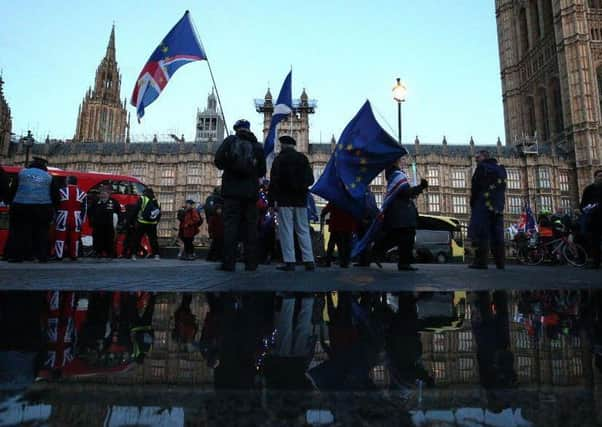Andrew Vine: Brexit divisions must be healed to save UK from extremism


The new dawn might have been tinged with a touch of trepidation, but the overwhelming mood was going to be one of optimism, that a newly-empowered country could determine its own fate, decide who crosses its borders and make its own laws.
Countries around the world would be falling over themselves to sign trade agreements, and the relationship with our former partners in the EU recalibrated as businesslike but cordial, friendships and mutual respect intact, but political ties severed.
Advertisement
Hide AdAdvertisement
Hide AdSensible deals would have been agreed so that lorries loaded with food and medicines flowed freely through the Humber and Channel ports, and holidaymakers bound for the Mediterranean passed through border checks smoothly. Public services, particularly the NHS, could look forward to an increase in their budgets as funds that had gone to the EU stayed at home instead.
This was the vision that March 29, 2019, held out, and had something approximating it been delivered the chances are that even the 48 per cent who voted against leaving the EU would probably have settled for it. With reservations certainly, but the British people’s instinct for making the best of things would have meant the country embraced it and coped with any hiccups along the way.
Matters could hardly have turned out differently. Not even the most pessimistic assessment of what might follow the 2016 referendum could have predicted the agonies that Britain finds itself suffering, nor the meltdown of politics.
Another Conservative Prime Minister is going down in flames, victim of what feels like an ancient curse on the party over Europe, there is no credible government-in-waiting on the Opposition benches and no consensus in Parliament over how to break the deadlock.
Advertisement
Hide AdAdvertisement
Hide AdDeparture from the EU may now be next month, or in May, or at the end of a lengthy extension. It is still just conceivable that it won’t happen at all. There may be another referendum, or a general election, but if that happens it is hard to see how either the Conservatives or Labour could produce coherent manifestos on which the warring factions within their ranks could stand.
It’s a measure how surreal the political landscape has become that a failed Prime Minister incapable of leading, let alone uniting, her own party still scores better in opinion polls of competence to do the job than a Labour leader deemed unfit for the office because of his hard-left policies.
But the tumult in Parliament is only the tip of the iceberg. What should concern us all equally is what all this is doing to our country, unseen amid the focus on MPs and the latest voting numbers. The issue of leaving the EU was always going to be divisive, but even braced for that, the vehemence of the referendum debate signalled that it would cause deep rifts. So it proved, but matters have grown worse since then.
It should be a matter of profound sorrow how deeply divided the last two years have left our country. They have set young and old against each other, and north and south. Urban and rural have been split, and friends, colleagues, and even family members have been driven apart. Everybody has suffered as a result. Those passionate about leaving the EU have been left frustrated and angry that their democratically-expressed will has not been delivered by politicians. Their frustration and anger have only been intensified by the realisation that Brexit is overwhelmingly unlikely to be in the form they were promised, or produce the benefits they believed their vote would bring, such as tighter control of immigration or a financial boost for the NHS.
Advertisement
Hide AdAdvertisement
Hide AdEqually passionate remainers have grown steadily more alarmed as the saga has unfolded, seeming to confirm their worst fears that the country would be cut adrift into an uncertain future that risks economic ruin thanks to the disproportionate influence of a small cabal of Tory right-wingers.
The deal Mrs May invested so much personal capital in – even the sacrifice of her job – has pleased nobody since the moment it was unveiled. This national angst at how things have turned out has manifested itself in some deeply troubling ways. The torrent of abuse levelled at MPs both via social media and by thugs screaming abuse in their faces outside Parliament is only a heartbeat away from turning into attacks.
That the Deputy Speaker of the Commons should feel it necessary to advise MPs against walking alone is a measure of how dangerous this level of anger has become. And there is no end in sight. The two-and-a-half years we have endured since the referendum is only a prelude. We are not yet even at the end of the beginning of this process.
After any deal is done, there is a further two years of detailed negotiations with the EU in store, which threatens the prospect of deepening the unrest in Britain. That makes it imperative that whoever succeeds Mrs May appreciates that Brexit has become about much more than the endless political wrangling at Westminster.
Advertisement
Hide AdAdvertisement
Hide AdThe challenge now is to heal the divisions, because if they are left to fester our country will become a fractious, unhappy nation. That could result in a prolonged period of unstable government as voters lose faith in the major political parties, or worse, see the rise of the sort of populist extremism that is on the march in parts of Europe.
If passing the deadline that was meant to be a gateway to a brighter future for Britain is to represent anything but failure, it must be a moment when politicians on all sides reach out to each other and the people in a spirit of co-operation and not rancour.